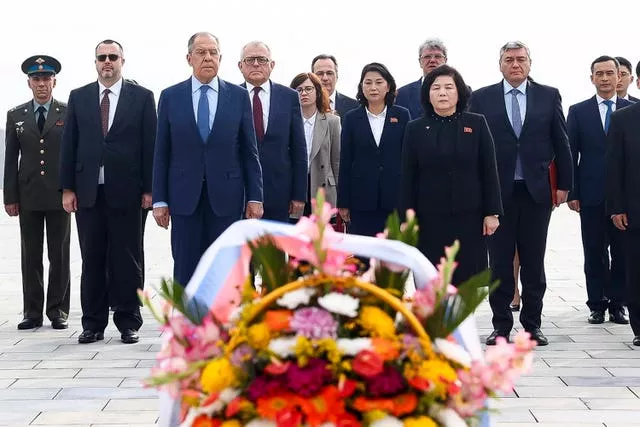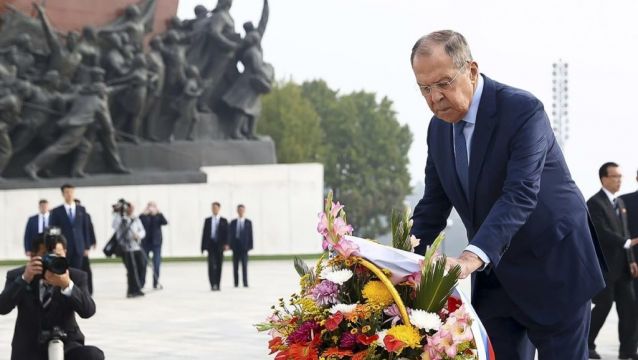The foreign ministers of Russia and North Korea met in Pyongyang for talks expected to focus on how to boost their military ties, days after the United States accused the North of sending fresh shipments of munitions to Russia to support its war efforts in Ukraine.
Russian foreign minister Sergei Lavrov flew to Pyongyang on Wednesday for a two-day trip.
During a reception speech later in the day, he thanked North Korea for its strong support for Russia’s war on Ukraine.
The focus of outside attention to Mr Lavrov’s visit is whether the two countries would provide any hints of how they would solidify their security co-operation or announce the timing for Russian President Vladimir Putin’s promised trip to Pyongyang to reciprocate North Korean leader Kim Jong Un’s visit to Russia’s Far East last month.
During his travel to Russia, Mr Kim met Mr Putin at the Vostochny Cosmodrome, Russia’s most important domestic space launch centre, and inspected other key Russian weapons-making sites.

That triggered intense speculation that Mr Kim seeks sophisticated Russian technologies to modernise his nuclear arsenal in return for supplying conventional arms to refill Russia’s exhausted weapons inventory.
“After the historic summit between President Putin and Chairman of State Affairs Kim Jong Un at the Vostochny Cosmodrome on September 13, we can confidently say that the relations have reached a qualitatively new strategic level,” Mr Lavrov said at the start of his meeting with North Korean foreign minister Choe Sun Hui on Thursday, according to Russia’s state-run Interfax news agency.
Neither country immediately released details of the meeting. But Mr Lavrov said on Wednesday that his visit was meant to discuss implementing the unspecified agreements between Mr Putin and Mr Kim that were reached during their September summit.
During a dinner banquet held for him, Mr Lavrov said Russia deeply values North Korea’s “unwavering and principled support” for its war on Ukraine as well as Pyongyang’s decision to recognise the independence of Russian-backed separatist regions in eastern Ukraine, according to Russia’s foreign ministry.
“We are fully aware that many countries worldwide share similar viewpoints and assessments, but only a select few, such as (North Korea), explicitly declare their solidarity with Russia and can express it openly,” Mr Lavrov said.
According to North Korea’s state media, Mr Lavrov also praised North Korea for “remaining unfazed by any pressure of the US and the West” and said Russia fully supports Mr Kim’s push to protect its security and economic interests.
Ms Choe said at the dinner banquet that Pyongyang and Moscow were building an “unbreakable comradely relationship” under the “strategic” decisions and leadership of Mr Kim and Mr Putin, the North’s official Korean Central News Agency said.

The White House said on Friday that North Korea has delivered more than 1,000 containers of military equipment and munitions to Russia.
The White House released images that it said show the containers were loaded on to a Russian-flagged ship before being moved via train to southwestern Russia.
The containers were shipped between September 7 and October 1 between Najin, North Korea, and Dunay, Russia, according to the White House.
Since last year, the US has accused North Korea of providing ammunition, artillery shells and rockets to Russia, likely much of them copies of Soviet-era munitions.
North Korea has steadfastly denied it shipped arms to Russia, but South Korean officials said North Korean weapons provided to Russia had already been used in Ukraine.
The recently flurry of diplomacy between Moscow and Pyongyang underscores how their interests are aligning in the face of their separate, intensifying confrontations with the United States.
In July, when Russian defence minister Sergei Shoigu visited North Korea, Mr Kim took him to an arms exhibition and a military parade, where some of the North’s newest and most powerful weapons were displayed.







